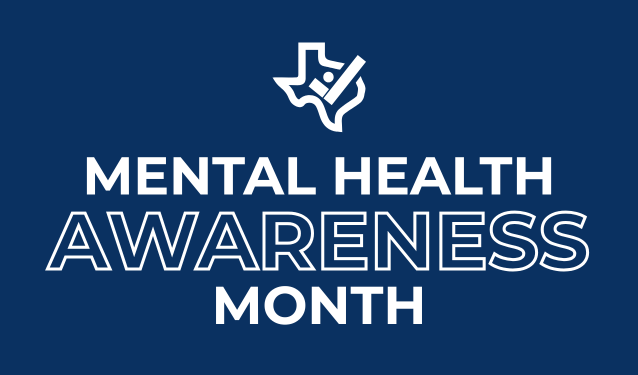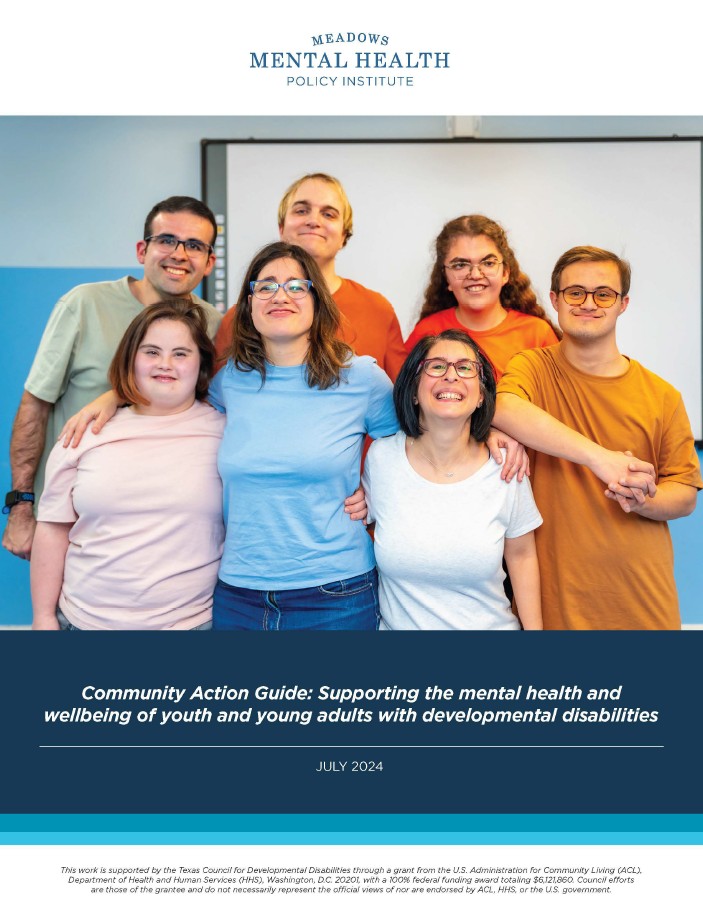

Table of Contents
Between 30-35 percent of people with developmental disabilities (DD) are also diagnosed with mental health conditions, according to the Mental Health and Developmental Disabilities National Training Center. These conditions can include major depression, bipolar disorders, anxiety disorders, impulse control disorders, personality disorders, and schizophrenia.
TCDD has supported grant projects across Texas to better understand and address the needs of youth and adults with DD and mental health conditions. The complexities of having both DD and mental illness create barriers to finding support, prevention, intervention, and treatment services. While people can experience mental health trauma regardless of whether they also have a disability, people with DD experience this trauma more frequently. Too often, their needs go unrecognized and untreated until a crisis happens.
As we recognize Mental Health Awareness Month this May, we’re sharing information and resources from several recent TCDD-funded projects that developed best practices to support Texans who are dually diagnosed as well as their families, teachers, and health care providers.
Training Educators in Dual Diagnosis
Texas Tech University (TTU), through the Virginia Murray Sowell Center for Research and Education in Sensory Disabilities, developed a training program for Texas educators working with dually diagnosed K-12 students. Called Project TEDD (Training Educators in Dual Diagnosis), the program used a “train the trainer” model to provide educators with the skills and knowledge to recognize, understand, and work with students who are dually diagnosed.
In addition to training workshops, Project TEDD created a free online training curriculum that covers collaboration and communication, crisis intervention, working with families, and more. Educators who completed the program’s training took what they learned back to their school districts to increase their colleagues’ understanding of students with DD and mental illness. Through this process, Project TEDD created new leaders in dual diagnosis among K-12 students in Texas and addressed a statewide need for more teachers and education professionals who have the skills and understanding to support students who are dually diagnosed.
One special education teacher in Corpus Christi said Project TEDD’s training on distinguishing between mental health issues and mental illness to be very impactful in her teaching and found crisis intervention strategies helpful in her classroom. An educator from Breckenridge ISD said the “resources and information from Project TEDD will help teachers understand the underlying function of student behavior while also providing methods for addressing the behaviors to enable the students to succeed. Additionally, the training will help raise awareness of the possibility of underlying mental health issues in our DD students.”
The Project TEDD website includes more information and materials. Here are a few examples of additional resources from the project:
Children with a dual diagnosis face serious learning challenges and need specialized support.
Dr. Devender Banda, Project TEDD director and a professor of special education at TTU, in a news release announcing the program’s launch in 2020
Children with a dual diagnosis face serious learning challenges and need specialized support.
Dr. Devender Banda, Project TEDD director and a professor of special education at TTU, in a news release announcing the program’s launch in 2020
Expanding Access to Mental Health Care
The Whole Person Project, developed by The Arc of Texas, studied statewide barriers to mental health care for people with DD and identified public policy recommendations to expand access to quality care and support for dually diagnosed people across Texas. The project also interviewed disability advocates and created a series of short videos featuring disability advocates speaking about their experience with accessing mental health care and other services.
As part of the project, The Arc of Texas published an investigative report (PDF, 37 pages, 1.08 MB) that examined areas where mental health support was lacking for Texans with DD. Titled “Out of Options: Addressing Inequities in Care for Texans with IDD and Mental Illness,” the report offered an expansive look at the state of mental health care for Texans who are dually diagnosed.
Here are some examples of topics discussed in the report:
- mental health screenings for people with DD in county jails;
- access to services through Medicaid waivers, psychiatric hospitals, and state-supported living centers; and
- workforce shortages for mental health professionals and personal care attendants.
The report also included recommendations to lawmakers on how to address mental health disparities, and highlighted stories from people with DD and their families who faced barriers to mental health care.
On The Arc of Texas YouTube channel, you can find a recording of a webinar about the report’s findings and recommendations.
Additionally, the Whole Person Project developed online training for mental health care providers who work with people with DD who may also experience mental health conditions. The training includes courses on understanding disability frameworks, dual diagnosis, legal requirements, and communication strategies. While intended mainly for mental health care providers, the training is also useful to anyone involved or interested in supporting people with DD who also have mental health conditions.
Enhancing Trauma-Informed Support
The Meadows Mental Health Policy Institute conducted research to gain a better understanding of the relationship between trauma, mental health, and DD for youth and young adults. The project looked into existing mental health resources available to young people with DD and identified ways that families and mental health providers could create a more trauma-informed system of care.
As part of the project, the Meadows institute published a Community Action Guide that summarizes the research into improving care and support for young adults with DD experiencing mental health crises. The guide highlights significant barriers that young adults with DD face when trying to access mental health care. Some of these barriers include fragmented services, a lack of trained providers, and systemic gaps in available support for people with DD transitioning to adulthood. The guide also lists 10 major community challenges, including limited access to trained mental health providers as well as a lack of meaningful employment and social opportunities for young adults with DD.
Despite these challenges, the Meadows guide identifies community strengths, including a robust network of local organizations and a comprehensive resource list categorized by services like crisis response, family support, and school-based mental health. The guide includes a call-to-action for communities to adopt trauma-informed practices for mental health care.
Inclusive and respectful language is a key theme. The guide defines terms like “neurodiversity” and “lived experience” and discusses advantages and disadvantages of commonly used language that refers to young adults with DD and mental health needs.
Additionally, the Meadows institute facilitated focus groups with young adults with DD and mental health concerns. The project also hosted three community convenings with people with DD who had personal experience seeking mental health care as well as family members and service providers. These convenings led to collaborative efforts to identify mental health resources as well as solutions to improve the care and support system in Texas. To learn more about the project, visit the Meadows institute website.
Improving how we identify and treat the mental health needs of youth with DD is something that requires community-wide action to ensure these young people have every opportunity to live happy and healthy lives as they become adults.
Excerpt from Meadows Mental Health Policy Institute’s Community Action Guide
Improving how we identify and treat the mental health needs of youth with DD is something that requires community-wide action to ensure these young people have every opportunity to live happy and healthy lives as they become adults.
Excerpt from Meadows Mental Health Policy Institute’s Community Action Guide
More Resources to Use and Share
During Mental Health Awareness Month, we encourage everyone to learn more about available mental health resources and advocate for accessible support and care, particularly for people who are dually diagnosed with DD and mental health conditions. When this month is over, let’s not stop. Keep raising awareness, showing compassion, and supporting mental wellness all year-round.
Here are a few resources to get started:
- Mental Health and Substance Use resources from the Texas Health and Human Services Commission.
- Starting the Conversation Guide (PDF), from the Substance Abuse and Mental Health Services Administration, provides advice on supporting someone struggling with mental health or substance use.
- Tips for How to Help a Person with Mental Illness, a webpage from the National Alliance on Mental Illness (NAMI) that offers information and suggestions on interacting with someone living with a mental health condition, including things to avoid.
- Your Language Matters Guide (PDF), from NAMI, includes suggestions on how to talk about mental health in clear, neutral ways that help eliminate misunderstanding.
- Mental Health First Aid, an online training course from the National Council for Mental Wellbeing, that teaches how to identify, understand, and respond to signs of mental illness and substance-use disorder.



